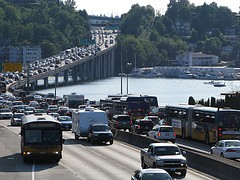 A pilot program is launching today to help match up drivers and riders who are crossing the Highway 520 bridge that connects Seattle and Bellevue. The project, called go520, is being funded by Washington state in an effort to reduce the number of single-occupancy vehicles crossing the bridge. The program is recruiting 250 drivers and 750 riders.
A pilot program is launching today to help match up drivers and riders who are crossing the Highway 520 bridge that connects Seattle and Bellevue. The project, called go520, is being funded by Washington state in an effort to reduce the number of single-occupancy vehicles crossing the bridge. The program is recruiting 250 drivers and 750 riders.
An Irish company called AveGo, which works on transportation software and technology, developed the pilot. To get commuters on board, they’ll give drivers who use the program 20 or more times each month a $30 gas card, and riders will receive up to $30 per month in “AveGo credits to use towards travel beyond the program covered by the go520 initiative,” according to a post on TechCrunch (I’m afraid I don’t really know what that entails). Drivers participating in the program need have an iPhone, while riders just need a phone that can text.
The timing is right. Come April, 520 bridge drivers will have to pay a toll of up to $3.50 per trip to help cover the cost of a new six-lane span across Lake Washington.
It’s a cool idea. I’ve often thought as I’ve driven past folks waiting for buses on particularly soggy days that I wouldn’t mind given them a lift if I knew where they were going (of course since they’re waiting for the bus, this would provide no enviro benefit, but you know what I mean).
And the Seattle-Bellevue area is not alone in this computerized carpooling experiment. Last week the New York Times reported on similar ventures in DC, Houston, San Antonio, and Austin. Let’s hope it takes hold in the Northwest and expands beyond the 520. Any ideas on other commuter routes that would be good candidates?
Update: Also check out these more detailed stories on the program in last week’s Sustainable Industries, and in Friday’s Seattle Times.
520 bridge traffic photo from Flickr user Oran Viriyincy used under the Creative Commons license.

Comments are closed.